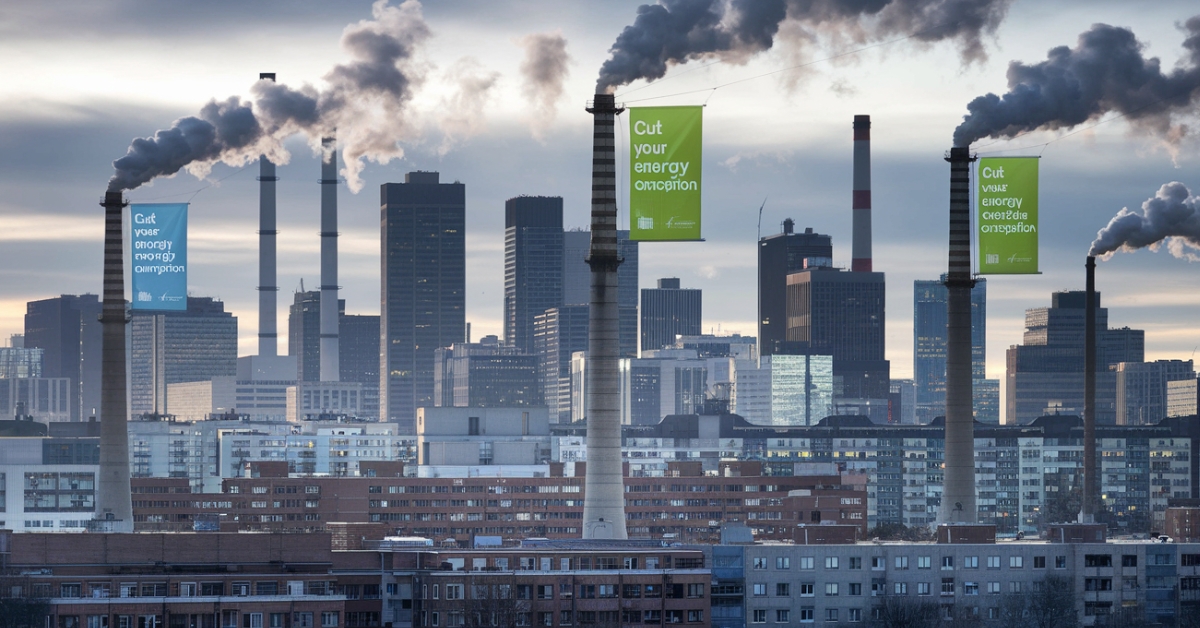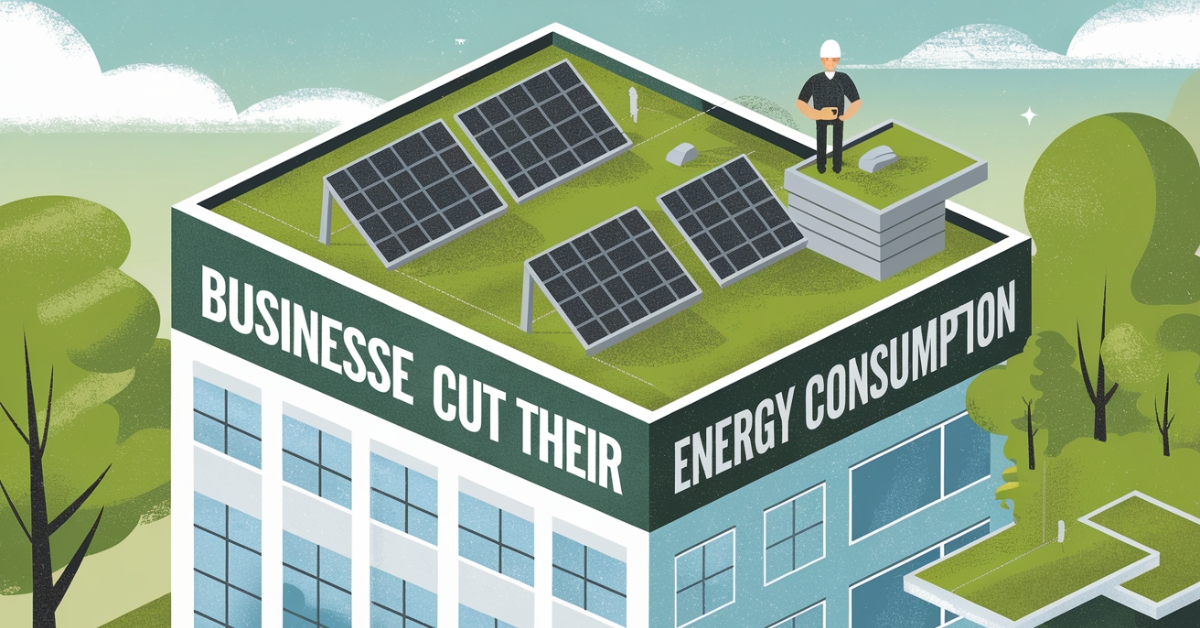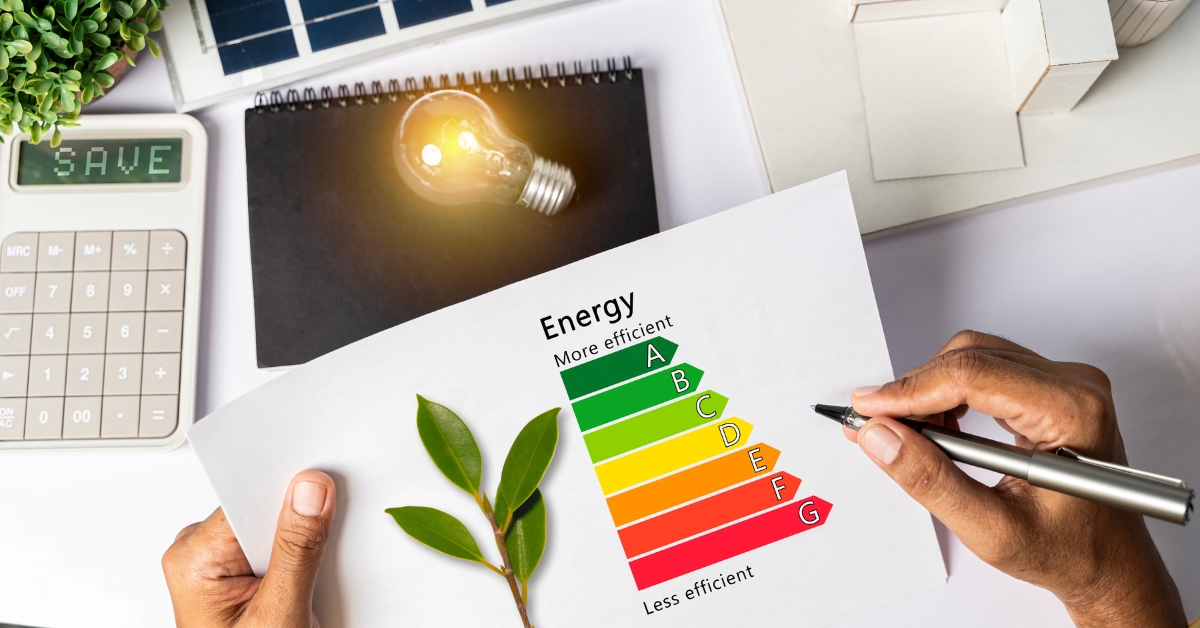Average UK Business Energy Consumption

As the UK’s population grows, so does the energy demand. Businesses, regardless of their size, play a significant role in this energy consumption. In 2023, the UK’s total energy consumption increased by 3.5% compared to 2022, adding further pressure on resources and highlighting the importance of energy efficiency in business operations. This growing demand raises questions about the future of energy consumption and its environmental impact.
Energy consumption isn’t just a cost factor for businesses; it also affects their sustainability strategies. Understanding key statistics on UK business energy consumption can help leaders make informed decisions as more companies move toward renewable energy sources. In this blog, we’ll explore updated business energy consumption figures, highlight key trends, and provide practical steps businesses can take to reduce their carbon footprint and costs.
Future Business Energy Consumption Trends
With global energy demand projected to increase by 47% by 2050, businesses worldwide must be prepared to adapt to this evolving landscape . The UK, in particular, is at the forefront of this shift, with many companies already prioritising low-carbon and renewable energy. By 2023, over 78% of large businesses in the UK were actively seeking renewable energy solutions to cut down on their carbon emissions, a notable increase from the previous year .
Renewable energy is set to account for 36% of the global energy mix by 2030, a significant rise from the current 27%. This shift is driven by the need to combat climate change and rising energy costs, with many UK businesses already investing in clean energy infrastructure. For instance, solar panels are becoming a popular choice for office buildings, offering companies a way to generate clean, renewable energy on-site. Additionally, electric vehicle (EV) registrations have surged, with businesses accounting for a substantial share. In fact, 68.2% of EV registrations in 2023 came from fleets and business consumers. With these statistics, we can see that it is important for businesses to provide their employees with EV charging stations.
As energy costs continue to rise and government regulations tighten around carbon emissions, businesses that fail to adapt may face higher operational expenses. By investing in renewable energy solutions now, businesses can future-proof themselves while contributing to a greener economy.
Credit: BBC News
Business Energy Consumption Statistics at a Glance

Energy consumption levels vary significantly depending on the size and type of business. Generally, larger businesses consume more energy, but smaller businesses are also increasingly aware of the need to reduce their carbon footprint. Here are some key updated statistics:
- Average energy consumption for small businesses: Between 12,000 kWh and 23,000 kWh annually for electricity, and 13,000 kWh to 30,000 kWh for gas .
- Micro businesses: Typically consume between 5,000 kWh and 15,000 kWh annually .
- Energy price impact: Due to rising energy costs in 2023, the Energy Price Guarantee saw energy costs increase by 20% in October 2023, following a 27% rise in 2022 . These rising prices mean that even businesses with stable energy consumption could face increasing costs due to market fluctuations.
As energy prices continue to rise, businesses need to pay closer attention to their consumption levels and seek ways to minimise costs. Many are opting for energy-efficient solutions, such as LED lighting and more efficient heating systems, which can help reduce overall consumption.
Average UK Business Energy Consumption Breakdown
Business energy consumption in the UK varies across different industries. The commercial services sector continues to be the largest energy consumer, using approximately 15,200 ktoe (kilotonnes of oil equivalent) of energy in 2023, up from 14,615 ktoe in 2022 . Other high-consuming sectors include manufacturing, transportation, and food production. Here's a breakdown of energy consumption by sector:
- Manufacturing and industrial services: 5,800 ktoe
- Chemical manufacturing: 3,600 ktoe
- Transport sector: 40% of total UK energy consumption
- Food, drink, and tobacco manufacturing: 3,000 ktoe
- Agriculture: 1,530 ktoe
The transport sector's high energy consumption can be attributed to the increased use of electric vehicles and rising fuel prices. With the shift towards cleaner transportation solutions, businesses in this sector are also facing pressure to adopt more sustainable practices.
For businesses looking to reduce their energy consumption, sectors like manufacturing and food production offer significant opportunities for efficiency improvements. Investing in energy-efficient machinery, smart meters, and renewable energy sources can help reduce consumption and lower costs.
Costs of Business Energy Consumption
Energy consumption has a direct impact on business costs. Rising energy prices, combined with fluctuating usage levels, mean that businesses must carefully monitor their energy consumption to avoid unexpected costs. Below is an updated breakdown of average energy costs by business size:
- Micro businesses: On average, pay £2,500 annually for gas and £7,000 for electricity .
- Small businesses: Annual energy costs can range between £13,000 and £15,000, depending on the type of energy used .
- Medium-sized businesses: Pay approximately £10,000 for gas and up to £27,000 for electricity annually .
| Business Type | Electricity Consumption (kWh/year) | Gas Consumption (kWh/year) | Annual Energy Cost (Electricity) | Annual Energy Cost (Gas) |
|---|---|---|---|---|
| Micro Business | 5,000 - 15,000 | 5,000 - 15,000 | £6,767 | £2,500 |
| Small Business | 12,000 - 23,000 | 13,000 - 30,000 | £13,450 - £15,000 | £4,862 |
| Medium Business | 25,000 - 50,000 | 30,000 - 65,000 | £26,736 | £9,823 |
| Large Business | 50,000+ | 65,000+ | £37,793 | £11,333 |
With these rising costs, businesses must explore ways to reduce their energy consumption. Some steps businesses can take to improve their energy efficiency are installing energy-efficient lighting, smart thermostats, and optimising machinery.
Reducing Business Energy Consumption: Key Steps

Given the rising costs and environmental implications, many UK businesses are exploring ways to reduce their energy consumption. Here are some practical strategies that businesses of all sizes can adopt:
- Invest in renewable energy: Solar panels and wind turbines can significantly reduce long-term energy costs. Solar energy has become particularly attractive in the UK, with government incentives available for businesses willing to invest in renewable infrastructure.
- Install EV charging stations: As more companies switch to electric fleets, installing EV charging points can reduce fuel consumption and boost a company’s green credentials. By 2025, it is estimated that 75% of UK businesses will have installed EV charging stations for their employees.
- Conduct regular energy audits: Energy audits can identify inefficiencies and suggest improvements. Businesses can significantly reduce their energy consumption by upgrading outdated machinery, lighting, or HVAC systems. Additionally, implementing smart meters and monitoring energy usage can help track and optimise energy use in real time.
- Adopt energy-efficient technology: Adopting new technology can result in major energy savings from LED lighting to energy-saving heating systems. Switching to energy-efficient lighting alone can reduce electricity consumption by up to 40% .
By taking proactive steps to reduce energy consumption, businesses can lower their operational costs and contribute to the UK’s overall sustainability goals.
What Type of Business Consumes the Most Energy?
Energy consumption levels vary greatly across different sectors in the UK. The goods and services industry consumes the largest portion of total business energy, accounting for 67% of the total business energy usage . Public administration follows at 26%, and agriculture makes up the remaining 7% . These figures highlight the significant demand for energy within these sectors and underscore the need for sustainable energy solutions.
Here's a breakdown of how each sector consumes energy, based on fuel type:
Commercial and Miscellaneous Services:
- Electricity: 43%
- Natural Gas: 34%
- Other Fuels: 23%
Public Administration:
- Electricity: 27%
- Natural Gas: 57%
- Other Fuels: 16%
Agriculture:
- Electricity: 24%
- Natural Gas: 6%
- Other Fuels: 70%
Following the goods and services sector, the manufacturing and industrial sector ranks next, consuming 16% of the UK’s total energy. Manufacturing relies heavily on natural gas and electricity, using 39% and 35% of these fuels respectively . This makes it a prime area for renewable energy adoption, as reducing reliance on traditional fuels can significantly cut costs and emissions.
How Can Businesses Cut Their Energy Consumption?

With energy prices constantly rising and climate change concerns growing, businesses must find ways to reduce their energy consumption. One of the most effective solutions is to adopt renewable energy sources.
1. Government Push Towards Renewable Energy
The push for renewable energy is more prominent than ever, with many governments—including the UK—committed to achieving net-zero emissions by 2050. The UK government has set ambitious targets, including sourcing 100% zero-carbon electricity by 2035 . To achieve this, large-scale changes to the national energy infrastructure are underway, and businesses are encouraged to take advantage of government incentives for renewable energy adoption.
2. Global Renewable Energy Trends
On a global scale, renewable energy projections have grown by 30% since 2006, with further increases expected by 2030. The demand for solar energy is anticipated to grow 30 times compared to 2006 levels, while wind energy demand is projected to increase fourfold during the same period. These trends reflect a growing recognition of the need for clean, sustainable energy sources globally and within the UK.
3. Current UK Renewable Energy Statistics
In 2024, the UK continues to make significant strides toward increasing its renewable energy capacity. As of the end of 2023, 39.9% of the electricity generated in the UK comes from renewable sources, while nuclear power accounts for 16.8%, and coal power has dropped to just 2.5% of the energy mix. This marks substantial progress in the country’s journey toward a sustainable, carbon-neutral future.
By implementing renewable energy solutions, businesses can cut down their energy consumption, reduce their carbon footprint, and improve their overall efficiency.
The Growth of Renewable Energy in the UK

The UK has made remarkable progress in adopting large-scale renewable energy. The transition to renewables has been so rapid that the UK is set to produce its trillionth kilowatt hour of renewable energy in 2024. To put this into perspective, it took 47 years (from 1970 to 2017) to produce the first half of this trillion, but the second half will be reached in just six years, between 2017 and 2023. This acceleration shows just how rapidly the country is advancing toward cleaner energy sources.
The shift from traditional fossil fuels is also notable. For example, in 2000, coal produced 120 TWh of energy, but by 2021, that figure dropped to just 6 TWh . The steep decline in coal usage illustrates the UK's commitment to reducing reliance on fossil fuels.
In 2022, the UK generated 30.5 TWh of renewable electricity in the second quarter alone, marking a 12% increase from the previous year. This growth was largely driven by wind energy, which is expected to continue expanding in the coming years . Offshore wind farms, in particular, are playing a crucial role in increasing the UK's renewable energy capacity.
Cutting Carbon Intensity and Emissions
One of the most encouraging trends is the reduction of carbon intensity. In April 2021, the UK achieved its lowest-ever carbon intensity, recording just 39 grams of CO2 per kWh. This reduction was primarily due to the decreased use of fossil fuels in electricity generation . The government's continued push for renewable energy sources will likely result in further reductions in carbon emissions.
Even the Covid-19 pandemic influenced energy consumption patterns, as lockdowns initially led to reduced energy usage. However, as restrictions eased, petroleum consumption saw a spike. This highlights the need for a more sustainable approach to transportation, such as the widespread adoption of electric vehicles (EVs). Businesses can play a crucial role by installing EV charging stations for employees, thereby reducing the carbon footprint of their operations .
Renewable Energy Milestones in the UK
The UK’s progress in renewable energy is also evident in its wind energy production. In 2022, wind power generated enough electricity to power two-thirds of homes in the UK, with onshore and offshore wind farms producing 25.5 GW of electricity . This renewable energy source has become essential for the country, powering millions of households and businesses alike.
The UK's renewable energy capacity continues to expand, with offshore wind farms accounting for most of the new capacity added in 2022. The total renewable energy capacity increased by 6.5% in 2022, reaching 3.2 GW by the second quarter of the year. This growth in renewable energy is a positive sign for businesses that want to reduce their reliance on traditional energy sources.
Credit: Kalkine Media
Why Businesses Should Invest in Renewable Energy?

As energy prices continue to rise and the UK government introduces stricter regulations to combat climate change, businesses have a unique opportunity to invest in renewable energy. Not only will this help reduce operational costs, but it will also improve the business’s sustainability credentials—something that increasingly matters to customers and investors alike.
Here are three compelling reasons why businesses should consider transitioning to renewable energy:
- Cost Savings: Investing in renewable energy solutions such as solar panels and wind turbines can help reduce long-term energy costs, especially as traditional energy prices continue to rise.
- Reduced Carbon Footprint: Businesses can significantly reduce their carbon emissions by switching to clean energy sources, contributing to global efforts to combat climate change.
- Future-Proofing: As the UK moves toward its net-zero target, businesses that adopt renewable energy early will be better positioned to comply with future regulations and take advantage of government incentives.
Conclusion
In 2024, the landscape of business energy consumption in the UK is evolving rapidly. With growing awareness around the importance of renewable energy, businesses are increasingly turning to renewable energy solutions to reduce costs, cut emissions, and future-proof their operations. As we look toward a net-zero future, the role of renewable energy in powering UK businesses cannot be overstated.
At Meteor Electrical, we understand the importance of energy efficiency and sustainability. That’s why we provide a range of energy-efficient products to help businesses reduce their energy consumption. Whether you're looking to upgrade your lighting or explore renewable energy options, we're here to help.
FAQs
1. What type of business consumes the most energy in the UK?
The goods and services sector consumes the most energy in the UK, accounting for 67% of total business energy consumption. Public administration and agriculture also use significant amounts of energy.
2. How can businesses reduce their energy consumption?
Businesses can reduce energy consumption by investing in renewable energy sources like solar and wind, conducting energy audits, and upgrading to energy-efficient technologies such as LED lighting and smart thermostats.
3. Why is renewable energy important for businesses?
Renewable energy helps businesses lower operational costs, reduce their carbon footprint, and comply with government regulations aimed at achieving net-zero emissions by 2050.
4. How much energy do small businesses typically use in the UK?
Small businesses in the UK consume between 12,000 kWh and 23,000 kWh of electricity annually, with gas usage ranging from 13,000 kWh to 30,000 kWh.
5. What government incentives are available for businesses using renewable energy?
The UK government offers various incentives, including grants and subsidies, for businesses that invest in renewable energy systems such as solar panels and wind turbines. These incentives can help offset installation costs.

